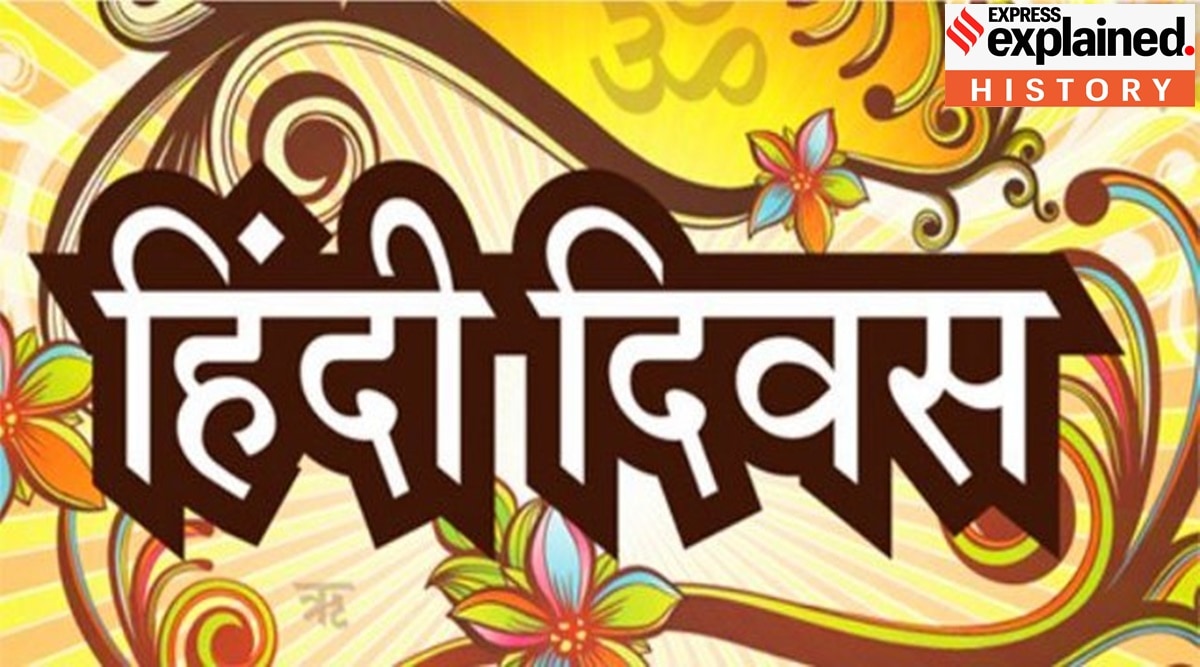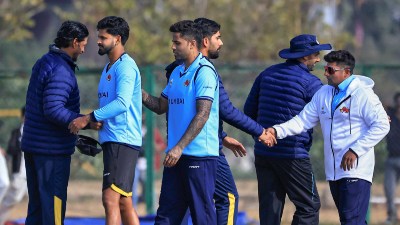
Hitting back at this, Tamil Nadu minister Udhayanidhi Stalin said it was “absurd” to claim that a language “spoken in just four to five states” unites the nation. “In Tamil Nadu it is Tamil, and Malayalam is the language in neighbouring Kerala. How is Hindi uniting these two states? How is it empowering?” he asked.
The Constituent Assembly chose Hindi as the official — not the national — language of the country after extensive discussions over three days. Shah and Udhayanidhi’s statements echo many of the debates in the Assembly then. Discussions were also held over what script should the Union adopt, what script should the numerals be in, and what should be the status of English. Hindustani (Hindi with more Urdu elements) and Sanskrit were among those proposed as official languages.
At length, the Munshi-Ayyangar formula — named after Drafting Committee members K M Munshi and N Gopalaswamy Ayyangar — was adopted as a compromise solution.
Explained below is the formula, and some representative quotes from the long discussions, to give an idea of the many views expressed and debated in the Constituent Assembly.
What the Constitution said on India’s official language
As part of the Munshi-Ayyangar formula, Article 343 of the Constitution as adopted in 1950 said, “The official language of the Union shall be Hindi in Devanagari script. The form of numerals to be used for the official purposes of the Union shall be the international form of Indian numerals.”
“Notwithstanding anything in clause (1), for a period of fifteen years from the commencement of this Constitution, the English language shall continue to be used for all the official purposes of the Union for which it was being used immediately before such commencement.”
Story continues below this ad
When the 15-year period came to an end, protests broke out over the fear of imposition of Hindi in large parts of non-Hindi-speaking India, particularly in Tamil Nadu. The resistance resulted in the Centre passing the Official Languages Act, which stated that English would continue to be upheld as an official language along with Hindi.
Debates on Hindi in the Constituent Assembly
RV Dhulekar: ‘Hindi should be national language’
Speaking on September 13, 1949, RV Dhulekar, from Jhansi in Uttar Pradesh, said Hindi should not just be the official language, but also the national language. “You say, Hindi is the official language. but I say it is the national
language. There was a race among the languages and Hindi has run the race and you cannot now stop its career.”
To those who wanted to retain English, he said, “But here you say, postpone the change for fifteen years. Then I ask, when are you going to read the Vedas and the Upanishads ? When are you going to read the Ramayana and the Mahabharata and when are you going to read your Lilavati and other mathematical works?.. After fifteen years?”
Story continues below this ad
To those who wanted Hindustani, he said, “… my honest advice to Maulana Hifzur Rahman [another Assembly member] is that he should wait for two or three years and he will find that he will have his Urdu language, he will have his Persian script; but today let him not try to oppose this, because our nation, the nation which has undergone so many sufferings, is not in a mood to hear him.”
Frank Anthony: ‘Don’t give up English’
Frank Anthony, who represented Central Provinces and Berar, made a case for English.
“I am bound to say with regret that I cannot understand the almost malicious and vindictive attitude towards English…do not let our resentment against the British be imported into our attitude towards the English language… a knowledge of English which our people have acquired over a period of 200 years is one of the greatest assets which India possesses in the international field.”
Pandit Lakshmi Kanta Maitra: ‘Sanskrit should be national, official language’
Story continues below this ad
Pandit Lakshmi Kanta Maitra, who represented Bengal, argued, “If today India has got an opportunity after thousand years to shape her own destiny, I ask in all seriousness if she is going to feel ashamed to recognise the Sanskrit language-the revered grandmother of languages of the world, still alive with full vigour, full vitality? Are we going to deny here her rightful place in Free India?”
About Hindi, he made the argument that it would be difficult to find enough qualified people to teach it to the rest of the country.
“If you want to coach up thousands and thousands of your young men in Hindi, you want teachers for that; you want literature for that, you ought to have elaborate printing machinery, books, texts, primers, teachers and all the rest of it. That would be a very great handicap… And mind you anybody from the Hindi-speaking areas would pose as a great Hindi scholar. I have got them tested and found them no good.”
Qazi Syed Karimuddin: ‘In Hindustani, both Hindus and Muslims can express themselves’
Story continues below this ad
Qazi Syed Karimuddin, again from Central Provinces and Berar, argued that even Mahatma Gandhi had championed Hindustani. “Congress had agreed that the national language of India would be Hindustani written both in Devanagri and Urdu scripts. If Mahatma Gandhi was alive today he, would have seen that on this issue Congress stood firm like a rock and Hindustani in both the scripts is adopted.”
“I say that only that language, in which both Hindus and Muslims easily express themselves and exchange their ideas and which has evolved through common intercourse, i.e. Hindustani, should be made the national language,” he added.
TA Ramalingam Chettiar: ‘Hindi can’t be national language’
T A Ramalingam Chettiar, who represented Madras, said they had agreed to Hindi simply because it was spoken by a large number of people in the country. “If we are going to accept Hindi, it is not on account of the excellence of the language, it is not on account of its being the richest language or on account of its being, as it has been claimed for Sanskrit, the mother of other languages and things like that. It is not that at all. It is merely on account of the existence of a large number of people speaking Hindi, not even a majority of the population of the country, but only among the languages which are spoken in India, Hindi claims probably the largest number of people.”
He then went on to argue why Hindi could not be the national language. “…you cannot use the word national language, because Hindi is no more national to us than English or any other language. We have got our own languages which are national languages and for which we have got the same love as the Hindi speaking people have got for their language.”







































